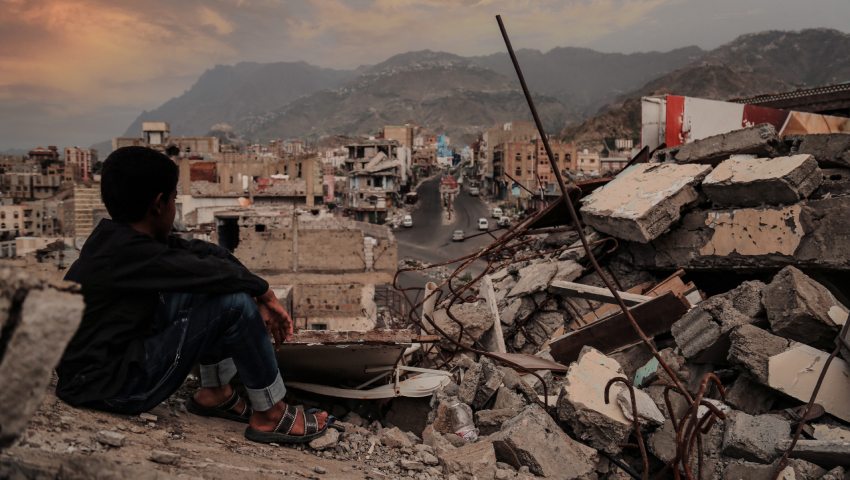Both the internationally recognised government of Yemen and Houthi Supreme Political Council have broadly respected the ceasefire announced at the beginning of Ramadan. Will the ceasefire last? And what would peace on the Arabian Peninsula mean for the region?
To continue reading the rest of this article, please log in.
Create free account to get unlimited news articles and more!
Since early April, the internationally recognised Yemeni government and the Houthi Supreme Political Council have adhered to the first ceasefire in six years. The move is in no part minor, with the British representative to the United Nations noting that “for the first time since 2016, Yemenis will feel what it is like to live in relative peace”.
Citing evidence from the Norwegian Refugee Council, the Middle East Monitor reported a “significant reduction” in losses resulting from intentional military activities since the beginning of the ceasefire – though the number of casualties from indiscriminate weapons “remained the same or higher”.
Fortunately, it appears that the ceasefire is holding.
The UN’s Office of the Special Envoy of the Secretary General of Yemen also confirmed that both the international recognised government, as well as the Houthi rebels, had agreed on a prisoner release.
1/UN Envoy Grundberg: "I welcome the release of detainees by the Saudi-led Coalition, and the earlier releases of detainees by Ansar Allah as well as the Government of #Yemen. Last month, the parties agreed through my Office on another exchange of detainees.
— @OSE_Yemen (@OSE_Yemen) May 6, 2022
Alexandra Stark, senior researcher at New America, explained how the ceasefire is opening pathways for humanitarian relief and how the actors may ensure long-term prosperity on the peninsula in War on the Rocks last week.
“In addition to pausing military operations across the country, the truce brings several concrete agreements: It allows two commercial flights into Sana’a airport each week, opens Hodeidah port to 18 fuel ships, and begins discussions on opening blocked roads in Taiz, a city in southwest Yemen that has been under siege for years,” Stark wrote.
Interestingly, the analyst explained that following the commencement of the ceasefire – Saudi Arabia pressured the head of the Yemeni government Abdrabbuh Mansur Hadi to resign, replacing him with an “eight-man Presidential Leadership Council”, explicitly indicating their willingness to signal for an end to the conflict.
Though, Stark explains that this should be of little surprise.
“On the Saudi-led coalition’s side, both the United Arab Emirates and Saudi Arabia have increasingly recognized in recent years that they will not be able to secure anything resembling a military victory,” Stark continued.
“Saudi Arabia and the United Arab Emirates may also see wrapping up their involvement in Yemen as part of a broader effort to find a more “functional” working relationship with Iran as nuclear deal talks slowly progress. For its part, Iran welcomed the truce announcement.”
To ensure that the ceasefire remains stable, Stark recommends that the United States provide security assurances to Saudi Arabia and the UAE to protect them in the event of attacks originating from Yemen – thus ameliorating the dilemma posed by a worsening in Yemen’s security situation.
“The United States can provide through missile defense systems and intelligence. US diplomats can also continue to support the UN Special Envoy’s efforts to ensure that these countries actually implement the terms of the current truce… finding solutions to problems — like the delays in the first commercial flight to Sana’a — will be critical to ensuring that negotiations stay on track,” she argued.
Bruce Riedel from the Brookings Institution notes the recent peace process indicated a geopolitical step change in Riyadh. Previously assertive and aggressively posturing in the region, the kingdom now appears to be learning from recent losses.
“The detente with Iran is another fundamental shift in Saudi policy under King Salman. His term in office has been the most virulently anti-Iran in Saudi history, highlighted by the break in relations, and the war in Yemen. Saudi Arabia has been the loser in the rivalry. Iran’s partners and proxies in Yemen, Syria, and Lebanon have gotten stronger since 2016,” he argues.
Thus far, Riyadh’s positive signals to work more closely with their former allies and regional adversaries have led to some positive developments.
“The king also hosted Turkish President Recep Tayyip Erdoğan, another country at odds with the Saudis over Yemen and especially the murder of Jamal Khashoggi in 2018. The Saudis and Turks also promised to improve economic relations,” the analyst contended.
It remains to be seen whether the ceasefire will last. However, opening of trade and humanitarian corridors through Sana’a and Hodeidah is a positive step in a conflict that has cost the lives of hundreds of thousands of people.
Get involved with the discussion and let us know your thoughts on Australia’s future role and position in the Indo-Pacific region and what you would like to see from Australia's political leaders in terms of partisan and bipartisan agenda setting in the comments section below, or get in touch with

 Login
Login







